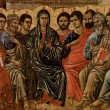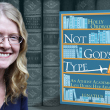Refuting the Myth Theory: 6 Reasons Why the Resurrection Accounts are True
by Dr. Peter Kreeft
Filed under The Resurrection

NOTE: Christians around the world celebrated Good Friday and Easter last week, which commemorate the death and resurrection of Jesus Christ. Thus we began a six-part series on these events by Dr. Peter Kreeft in which he examines each of the plausible theories attempting to explain what happened to Jesus at the end of his life, particularly whether he rose from the dead. Part 1 - 5 Possible Theories that Explain the Resurrection of Jesus Part 2 - Rejecting the Swoon Theory: 9 Reasons... Read More
Debunking the Conspiracy Theory: 7 Arguments Why Jesus’ Disciples Did Not Lie
by Dr. Peter Kreeft
Filed under The Resurrection

NOTE: Christians around the world celebrated Good Friday and Easter last week, which commemorate the death and resurrection of Jesus Christ. Thus we began a six-part series on these events by Dr. Peter Kreeft in which he examines each of the plausible theories attempting to explain what happened to Jesus at the end of his life, particularly whether he rose from the dead. Part 1 - 5 Possible Theories that Explain the Resurrection of Jesus Part 2 - Rejecting the Swoon Theory: 9 Reasons... Read More
Why Something Rather than Nothing?
by Matt Fradd
Filed under Cosmology, The Existence of God

After a night of teenage exuberance, my friends and I would usually end up lying out on a country road, gazing up at the starlit Australian sky, discussing the meaning of it all. We considered ourselves nonreligious, and yet there was something (isn’t there?) about the enormity of the sky that humbled us, stirred us, inspired us to ask deep questions about, well, everything. We called these GLUE conversations—GLUE being an acronym for God, life, the universe, and everything. One of... Read More
From Atheist Professor to Catholic: An Interview with Dr. Holly Ordway
by Brandon Vogt
Filed under Atheism, Conversion, Interviews

Growing up, Holly Ordway was convinced God was little more than superstition, completely unsupported by evidence or reason. She later attained a PhD in literature, traveled the country as a competitive fencer, and became a college English professor, none of which left room for God. But one day a smart and respected friend surprisingly revealed he was a Christian. That sent Holly on a search for the truth about God, one that weaved through literature, aesthetics, imagination, and history.... Read More
Three Bad Attitudes Theists Have Towards Atheists
by Trent Horn
Filed under Atheism, Religion

Norman Vincent Peale, who wrote The Power of Positive Thinking, once said, “The trouble with most of us is that we would rather be ruined by praise than saved by criticism.” It’s hard to honestly face criticism, but it’s the only way we can grow as human beings, since we are notoriously good at deceiving ourselves about our own competence and knowledge.1 That is why I hope theists and atheists will consider shedding attitudes we might unknowingly possess that can hinder productive... Read More
The Road from Atheism: Dr. Edward Feser’s Conversion (Part 3 of 3)
by Dr. Edward Feser
Filed under Atheism, Conversion

NOTE: On Monday we shared Part 1 of Dr. Edward Feser's conversion story from atheism to theism and on Wednesday we posted Part 2. Today we share the final Part 3. We'd also like to note that Dr. Feser's contributions at Strange Notions were originally posted on his own blog, and therefore lose some of their context when reprinted here. Dr. Feser explains why that matters. Several crucial background elements were in place by the late 90s. Fregean and related arguments had gotten... Read More
New Support for the Cosmological Argument
by Trent Horn
Filed under The Existence of God

One of the most interesting and widely discussed arguments for the existence of God is the kalam cosmological argument, which attempts to prove that it is impossible for the universe to have an infinite past. If the argument proves the universe had a beginning, then it follows that some cause that transcends the universe must have brought it into existence. The defender of the kalam argument may also advance other arguments attempting to show that the cause of the universe is God. Although... Read More
Turning the Problem of Evil On Its Head
by Joe Heschmeyer
Filed under Objective Morality, The Problem of Evil

Many atheists are fond of using the argument from evil to debunk the notion of God. It goes something like this: If God is all-powerful (omnipotent), He could stop evil. If God is all-loving (omnibenevolent), He would stop evil if He could. Therefore, if an omnipotent, omnibenevolent God existed, evil would not. Evil exists; therefore, an omnipotent, omnibenevolent God does not. Another variation of the argument was put forward by the Greek philosopher Epicurus, centuries before the... Read More






